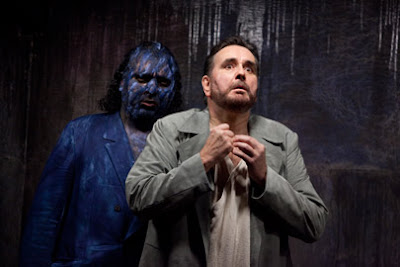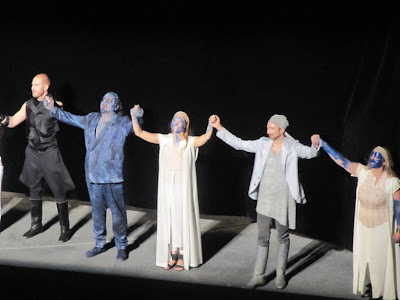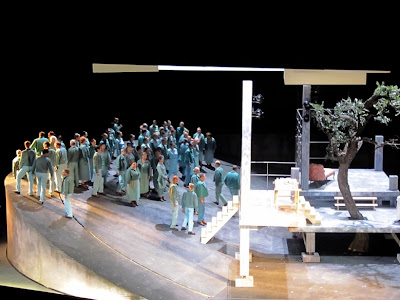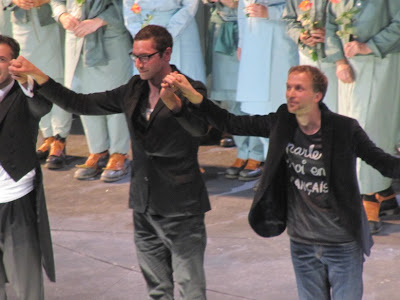Director ..... David Hermann
Conductor ..... Justin Brown
Énée ..... John Treleaven
Chorèbe ..... Armin Kolarczyk
Panthée ..... Lucas Harbour
Narbal ..... Konstantin Gorny
Iopas ..... Eleazar Rodriguez
Ascagne .....Stefanie Schaefer
Cassandre ..... Christina Niessen
Didon ..... Heidi Melton
Conductor ..... Justin Brown
Énée ..... John Treleaven
Chorèbe ..... Armin Kolarczyk
Panthée ..... Lucas Harbour
Narbal ..... Konstantin Gorny
Iopas ..... Eleazar Rodriguez
Ascagne .....Stefanie Schaefer
Cassandre ..... Christina Niessen
Didon ..... Heidi Melton
Anna ..... Karine Ohanyan
Helenus/Hylas ..... Sebastian Kohlhepp
Priam/Spectre de Priam ..... Luiz Molz
L'ombre d'Hector/Le dieu Mercure ..... Avtandil Kaspeli
Un prêtre de Pluton ..... Andrey Grabovsky
Polyxène ..... Veronika Pfaffenzeller
Soldat troyen ..... Marcelo Angulo
Soldat troyen ..... Alexander Huck
Un soldat/Un chef grec ..... Florian Kontschak
Helenus/Hylas ..... Sebastian Kohlhepp
Priam/Spectre de Priam ..... Luiz Molz
L'ombre d'Hector/Le dieu Mercure ..... Avtandil Kaspeli
Un prêtre de Pluton ..... Andrey Grabovsky
Polyxène ..... Veronika Pfaffenzeller
Soldat troyen ..... Marcelo Angulo
Soldat troyen ..... Alexander Huck
Un soldat/Un chef grec ..... Florian Kontschak
Badischer Staatsopernchor
Badische Staatskapelle
This feels good! Just when I started thinking opera was not bringing the same thrill to me as it used to, and I should perhaps consider focusing more onto theater, I got lucky --attended a streak of brilliant productions-- and I'm all good now!
Yes, people may argue that opera is all about good singing and up until the late 90's that was 90% true. Today, however, good singing alone is of course welcome, but definitely not enough. To me opera has this uniqueness to transcend the narrative and relate to our life 'here and today', it humanizes our daily routine and it does it in a way no other art form can. However, like any other art form opera goes through changes. The score is as it is, the orchestra and the singers try and bring new interpretations, put more emphasis on what better resonates with the public 'today'... but the bottom line is that the score was fixed by the composer, libretto by the librettist, and it is up to the intelligent and talented directors to provide a creative kick that eventually results is something unique, sometimes breaking to a whole new quality. Of course the untalented or lazy directors can achieve the opposite and make you dislike the opera you used to love, turn the opera producing into activity into a sclerotic decorating exercise.
To be perfectly honest I saw 3 production of Les Troyens on DVD, 1 video (of the Amsterdam production presented a year and a half ago), in addition to 2 productions I was able to attend in person, and... and none of those was really-really great. The one in Paris was very well sung but the staging was only OK-ish, while the one from Valencia was good in parts but somehow got lost in too many Terabytes of video-imagery. The production I saw in Berlin last year sits somewhere in between -- a mixture of good and less good moments.
Every decent production of Les Troyens is impressive for the grandeur of the score, the cast, for the numerous mass scenes and the role of the chorus, for the gigantic orchestra, and of course for the peculiar musical beauty, the eclecticism of styles in all aspects of the opera.
Another observation I would like to make is that in all of the productions I could see so far, the first part (La prise de Troie) is always done much better than the second one (Les Troyens à Chartage.) The Karlsruhe production is actually the first without that inequality. The second part of this show is probably even more captivating, more moving, and this is one of the reasons why I believe the work by David Hermann is the best production of Les Troyans ever. That impression was corroborated by a huge performance of Heidi Melton, who shined thousand colors as Didon and gave the second part of the opera that extra kick to sustain the level of dramatic tension defined in the first part.
David Hermann proves that he is an uncommonly talented director. No, he is not your favorite "Regie" director. In fact he has the quality of (very inspired) David McVicar as far as narrating the story goes, but with several guiding ideas and details that like an accessory help distinguishing his shows. If the productions by Benedikt von Peter are more intellectually engaging, those by David Hermann are multi-layered in a sense that they are easily accessible by everyone: the traditionalists cannot complain --the story is told as written-- but Hermann goes deeper and offers to everyone something more to chew on. A big part of the success of his productions --either Les Troyens (Karlsruhe) or The Queen of Spades (Basel)-- is due to his collaborator Christof Hetzer who designs the sets and costumes. They are evidently on the same wavelengths and there is nothing too much on the stage, and nothing is missing to scenically construct the story with a total clarity.
In this sensational production of Les Troyens, (almost) EVERYTHING is great! The only problem that I am sorry to have to mention is John Treleaven whose Énée, in spite of some OK-ish moments, is simply insufficient. He was trying to save the best for the end, suffered immensely through "Nuit d'ivresse" (Act-4), and finally --in the 5th Act-- was obliged to push beyond his limits to pull off "Inutiles regrets" but the result was not pretty. The crowd booed him in the end, that I could understand but still felt bad for him (this role --with all its tremendous changes in styles and in pace-- is so devilish to sing.) However, this shortcoming of the production was largely compensated by the stunning Didon -- Heidi Melton.
She is one of those extremely rare singers with a big-broad Wagnerian voice, but since she's still very young that voice is impressively agile. This role contains lots of patches that require the singer to dig deep and make all those gravi audible, which Heidi does wonderfully; and yet there several big moments when Didon unreservedly employs her top notes -- that sound gloriously when sung by Miss Melton [my guess is that Marjorie Owen and Paulina Pfeiffer might be similar to Heidi in that respect.] I don't know if she is this great in other roles she normally sings, but Didon is like handed to her by God. Her French is perfectly comprehensible and I didn't detect any "hard t" pronounced during the entire show. It is the beauty and the power of her voice, and her incredible endurance that fill you with awe, and somewhere towards the end it really is jaw-dropping.
Didon is a tough role to sing in terms of incarnation too: if a singer does not bring the vocal depth to emphasize the emotional drama of the character, the second part of the opera will most probably fall flat. The moment Heidi appeared --singing from the balcony---she instantly established her vocal authority. She was indeed the Queen out there, in every sense of the word! The transition from Didon public-figure to Didon a tender woman, was very well nuanced both vocally and scenically. Sorry if I'm gushing too much, but this was so outstanding and such a rarity today that I'm still all in bubbles.
All other singers were very good or excellent. The vocal and scenic engagement by Cassandre, sung and acted by Christina Niessen, was truly fantastic. Her voice maybe lacks in broadness but she compensates it by a very energetic emission. Part of her scenic brilliance comes from the way David Hermann organized the show, but she definitely did an excellent job too. Among singers I would also like to mention Eleazar Rodriguez, Konstantin Gorny, Lucas Harbour, and the crowd was particularly enthusiastic about Armin Kolarczyk. Still I feel unfair to single out anyone -- they were all wonderful! They were all 100% focused and clearly trying their best. More power to the Karlsruhe ensemble. ;)
Another jaw-dropping performance came from the orchestra. This score is extremely difficult to pull out properly: it contains highly dramatic moments (you could tell how big the influence Berlioz was on Wagner), and yet there are very many lyrical episodes that one should properly define and distinguish from the rest (otherwise it sounds messy), without lowering the dramatic tension. Maestro Justin Brown preferred the dramatic line of the score, and the lyric elements are used to give an emotional extra-dimension to the drama. This reading of the score perfectly with works with me and I loved the way the orchestra sounded the whole evening.
His job becomes much more difficult when you realize the size of the orchestra: heavy brass section was moving from the backstage to the balcony, or to the sides of the stage, but they never missed the timing or got delayed. He kept the composure of the orchestra at every moment of the show. Another difficulty to add is the overwhelming presence of the jumbo-chorus. For scenic purposes the chorus is very mobile (backstage, on the stage, laterally to the stage, in auditorium, on the balconies...) and to keep the whole pack together is really difficult. Only once I noticed a tiny delay when the chorus rushed (in the fifth act). One more delay of the orchestra I noticed when they had to catch up the two sentry-singers in the beginning of Act-5. Yes, I am nitpicking but not to criticize, but to try to tell you how extraordinary it was to have only two details to nit-pick during an over 6 hours long performance in which the singers were never drowned by the orchestra. Outstanding job by the chorus meister, Ulrich Wagner, and especially maestro Justin Brown!
I don't know if this production is 'filmable' [it is scenically too complex to capture properly everything that goes on, on and off the stage], but I sure hope a DVD release is planned -- at least to keep our memory of this great show alive (and hopefully with Iain Storrey as Énée.)
Finally, about the direction: The ground idea of David Hermann was to distinguish from the very beginning all the dead people (a.k.a. shadows) who later come back to haunt Troy and Chartage, i.e. those who communicate with Cassandre, but also with Didon, Énée, Narbal... They [the dead people] are in fact present on the stage and are used when the death becomes inexorable or when their loved once have hard time coping with reality, or when they worn the heroes about the fate of the Trojan people. Those dead people are entirely blue.
La prise de Troy:
In the opening scene we see Troy as a hill [ramparts of Troy] with plenty of wooden shields partly covered in blue stains. Blue can be viewed as blood here (noble blood) -- but obviously in a figurative sense: every stain actually means a life that has been lost, sacrificed to defend Troy. Somewhere among those shields you could see the casualties of war --all in blue-- one of whom turns out to be Hector, husband of Andromaque, the man who we keep seeing throughout the whole evening (very good Avtandil Kaspeli!)
A line of Trojans is formed on the "horizon" and they run down the hill to celebrate the liberation of Troy, the end of the siege. It is a big chorus: once the first line came down the hill, the second line appears on the horizon and they then all join in the celebration of victory. They are wear white (some of them having visible blue stains -- wounds of the past war?! -- from the noble defense of the city.) They then spread out in auditorium, i.e. they step beyond the city's ramparts. Cassandre appears almost indistinguishable from the other Trojan women. That is a choice by Hermann that I particularly loved [I bet McVicar would do that this way too]: directors often tend to portray Cassandre as a witch, or emphasize the uncanny side of her. Here she's like any other woman: she's in love with Chorèbe, and her visions terrify her on both levels: collective (she foresees the end of Troy) and personal (she sees the death Chorèbe.) Since everybody goes to celebrate, she "knows" what is bound to happen and tries to prevent Chorèbe from going. To make the whole thing dramatically plausible, Hermann avoids pathos, and portrays Chorèbe as a man who --after a long siege-- is too tempted to join the victory celebration party and the Cassandre's ominous warnings are just a pain in the neck to him. That's exactly how he reacts to her warnings.
The Troyans are at that point spread all over the auditorium, while Cassandre remains on the stage, refusing to mix with others. In the end of Act One, the happy Trojans bring in the Trojan Horse, which in this production is a large black zeppelin that was filling the right side of the auditorium, and I didn't even think this was a part of the sets.
The episode with Andromaque coming with her son is nicely staged too: she walks down the hill and right next to her is her dead husband Hector (all in blue.) She's a symbol of all the widows of Troy.
Act-2 is scenically organized on two levels: above, in the dark, is the Trojan horse and the Trojans fighting the Greek invaders, while below is a shelter. Énée will go with his men to rescue the treasury of the King Priam (killed by the Greeks), while Cassandre remains with the Trojan women. You could see the palms of Cassandre's hands going blue -- the death is imminent. The women are scared and they now all trust Cassandre, but they face the death differently: some are afraid of tortures, rapes and slavery that Cassandre predicts would happen if they waited alive for Greeks to come, others are afraid of the idea of suicide, hoping they could escape the destiny.
Finally, after the battle --that scenically was cleverly contoured with light effects in the dark, dead Trojan soldiers in the background... -- the Greek soldiers appear on the top of the shelter, which is when each of the women in the shelter takes a blue tablet from Cassandre and commits suicide. At last Cassandre also dies in blue: she smears the blue from her palms all over her face. She dies knowing that the Priam's treasury is saved and the Trojans, lead by Énée, will escape and eventually build a new city in Italy (Rome).
Les Troyens à Chartage:
The second part of this great-great-GREAT opera contains many lyric moments and it is difficult to keep the dramatic level up, as defined in the first part. Most directors run out of ideas and indulge in the ballet numbers. Another problem is that the second part is longer than the first one, containing many chorus scenes, longer instrumental intervals. David Hermann and Christof Hetzer come up with their thing: they set a three leveled platform placed-stage placed on the slope of the inclined stage that will turn around its vertical axis only once, when it will be necessary (there is no too much annoying stage spinning!)
Action?! The people of Carthage (all in green) fill up the auditorium to salute their Queen. The stage is covered by a black screen on which is projected the image of Didon (the Queen) who --with her courtiers-- is standing on the left balcony and sings GLORIOUSLY! She then comes down to greet every one of her Carthaginians, when the screen covering the stage is lifted and she enters her apartment -- 3 leveled platform mentioned above with a tree in the middle. She sits on a couch and has her moment of feeling lonely that she confides to her sister Anna. She [Dido] swore she would remain faithful to her defunct husband Sichée, but the loneliness and responsibility are too heavy on her. That too is scenically brilliantly fluidly presented: she steps to a platform that represents a garden where you can see a chair covered by a white sheet that reminds her of her husband, and there she swears again to remain faithful.
Will finish this part later/tomorrow...
Production Photos ©Markus Kaesler and Jochen Klenk
PART ONE: La prise de Troy
 |
| Trojans are descending the city ramparts -- the deaths (shadows) move uphill... |
 |
| Andromaque and her son: the shadow of her defunct husband Hector is that blue man behind her (noble tears of this widow are also blue) |
 |
| The Trojan Horse is welcomed to Troy |
 |
| Énée learns (from Hector <-- shadow behind him) that the King Priam is dead... |
 |
| ...and mobilizes his men to rescue the Trojan Treasure |
 |
| See the silhouettes of the Greek soldiers and the women of Troy underneath -- they are committing the collective suicide |
PART DEUX: Les Troyens à Chartage
 |
| Didon pledges to her defunct husband Sichée to remain faithful to him and to their love... |
 |
| Trojans came to Carthage - ask the Queen Didon to stay to regroup after the ship wreckage |
 |
| Episode with flowers and the cultural difference between Iopas (Carthage) and Ascagne (Troy) |
 |
| Didon and Énée in the garden |
 |
| Trojans feel homesick, and eager to go... |
 |
| ... and eventually depressed. |
 |
| The deads (Priam, Hector, Cassandre) warn Énée that the Trojans should leave to Italy and build a new city |
 | |
| Énée has left and Didon dies in a memorable scene |
My photos:
Once you enter the building of the Badisches Staatstheater, there is plenty of material and information to look, but strangely there was no any poster or a big thing saying that it was a premiere or that they were presenting Les Troyens. Only in the window completely hidden by the staircase (right from the entrance) there was some PR material. BUT, there was a horse... the Trojan Horse!
 |
| This is how the Badisches Staatstheater looks like (see the horse in the center!?) |
 |
| the same horse |
 |
| Inside, there is a book/CD-shop with a good name... |
 |
| Inside the vast Badisches Staatstheater there are many bar points and a (affordable) restaurant, but I liked the paintings of all the members of their ensemble hanging on the large concrete walls |
 |
| Definitely kills the grayness and it looks good! |
 |
| Inside the auditorium the size of which is slightly smaller than the one in Amsterdam (for comparison) |
 |
| The program costs you only 2.5€ |
 |
| From the house's magazine: a photo from the rehearsal with David Hermann explaining his concept to the cast members |
Curtain call pics:
 |
| Cassandre -- Christina Niessen |
 |
| Greek Soldier, Hector, Polyxène, Chorèbe, and Cassandre |
 |
| Three level platforms -- clever way to organize simultaneous actions on the stage |
 |
| Profile of the stage |
 |
| Blue/dead people (shadows) and Carthaginians (chorus -- only a part that I could fit in the objective) |
 |
| Hylas, Ascagne and Narbal |
 |
| Anna, Iopas, Panthée, and Sichée |
 |
| Konstantin Gorny, John Treleaven, Heidi Melton, and Maestro Justin Brown |
 |
| TRIUMPH for Heidi Melton and Justin Brown |
 |
| Most deserved ovations for David Hermann |
 |
| Christof Hetzer and David Hermann (who is French-German, which explain the shirt ;)] |




Great article! Thank you very much! For me it was one of the 10-20 most intense opera nights in more than 20 years as an opera fan. I would like to mention another singer: Sebastian Kohlhepp as Hylas. He just finished his training as an opera singer and "Vallon sonore" at the beginning of the 5th act was really moving.
ReplyDeleteHi & Thanks! Before going to Karlsruhe I actually did expect Hermann to put up a good show, but did not expect at all that level of singing, of the orchestra, of the total investment in the show by all the singers, all the chorus members, the orchestra... this was just an outstanding opera evening for its quality AND intensity - as you rightly stress. Cheers
ReplyDeleteBefore the second performance of Les Troyens on Friday, it was announced that John Treleaven could not sing the second part due to a surgery for kidney stones three weeks ago.
ReplyDeleteLance Ryan sang the Carthage Acts from the side while John Treleaven was on stage and lip-synced.
Heidi Melton and Lance Ryan were fabulous!
Lucky you! That must have been GREAT.
ReplyDelete